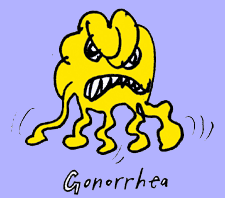
* Avoiding STIs * Full list *
Gonorrhoea

Gonorrhoea is now incredibly common.
Pronounced:
"Gonna-ree-a"
What is gonorrhoea?
Gonorrhoea is a bacteria that
mainly infect the genitals, urethra, rectum and throat of men and women.
How is it passed on?
It is passed on by unprotected vaginal, oral or anal sex, sharing sex toys, or
by a mother to her baby at birth.
Signs and symptoms
About 10% of men and 50% of women with gonorrhoea show no symptoms. Symptoms can
be mild and go unnoticed, but typical signs of infection include:
• Unusual discharge from
the penis or vagina that can be thin or watery, or yellow or green.
• Pain when passing urine.
• Possible irritation or discharge from the anus.
• Lower abdominal pain.
• Pain or tenderness in the testicles.
Tests and treatment
Usually a swab is taken
from the vagina or tip of the penis and a sample of urine may be taken. The swab
may feel a bit uncomfortable but should not be painful.
• Gonorrhoea is easily treated with antibiotics. To avoid re-infection, sexual
partners should also be treated.
• If untreated, gonorrhoea can infect other reproductive organs in men and
women and lead to serious health problems such as pelvic inflammatory disease or
ectopic pregnancy, which can affect fertility.
Tests and treatment
In rare cases, it can get into the bloodstream, leading to heart, joint and skin infections.
Girls: it could lead to pelvic
inflammatory disease or infertility.
Lads:
infection of the testicles.

For
more STI info: www.ruthinking.co.uk,
www.fpa.org.uk,
STD
Factfile